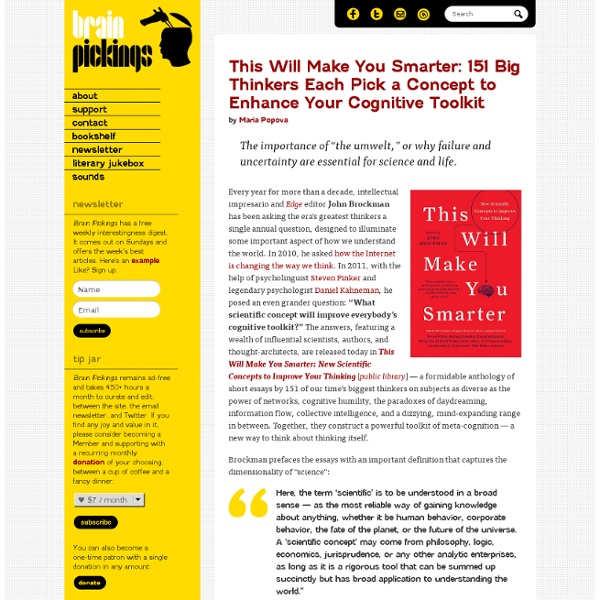



Gazelle Life: What are the top 10 things that we should be informed about, in life Everything is a Remix Part 4: System Failure by Maria Popova A brief history of intellectual property, or why 1790 was more culturally progressive than 2012. For the past year, Kirby Ferguson has been tracing the history and evolution of remix culture in his fantastic ongoing series Everything Is A Remix, with each episode tackling a different facet of collaborative creation. This week, the fourth and last part of the series, titled System Failure, finally makes its timely debut in the aftermath of SOPA and the peak of the ACTA debates. Our system of law doesn’t acknowledge the derivative nature of creativity. Instead, ideas are regarded as property, as unique and original lots with distinct boundaries. The closing lines capture the urgency of the issue with remarkable eloquence: We live in an age with daunting problems. (As an evangelist of combinatorial creativity, Part 3 remains my favorite — do check it out.) Brain Pickings has a free weekly newsletter and people say it’s cool. Share on Tumblr
Learning in a Digital Age - extending higher education opportunities for lifelong learning View or download the publication (PDF )1 View the publication in ePub format2 View the publication in Kindle format3 View or download the publication in text only format (PDF )4 Order print copies5 An increasing number of students are benefiting from education later in life, bringing diverse experiences, skills and needs and adding value to employers and society. What the publication offers Aimed at individuals in further and higher education who have an interest in lifelong learning: academic staff, lecturers, tutors, learning support staff, learning technologists, and information, advice and guidance professionals, the publication signposts some of the effective higher education practice taking place in the UK and addresses the benefits and challenges that arise in a digital age. The eleven institutional case studies have been aligned against the following themes: Learning in a Digital Age is the latest in the Effective Practice series from the JISC e-Learning Programme. Tables and diagrams
What to Do With Too Many Ideas? Full Spectrum Reading List: 7 Great Books by TED 2012 Speakers by Maria Popova Anatomy of introversion, inside the brain’s optimism bias, and a blueprint for doomsday from PC Guy. TED time is once again upon us, with this year’s conference, themed Full Spectrum, a mere week away. In preparation, and true to the Brain Pickings pre-TED tradition, here are seven exceptional books by some of this year’s TED speakers, spanning everything from psychology to children’s books to satire — a full spectrum, indeed. (Catch up on reading lists from years past: TEDGlobal 2010, TED 2011 Part 1 and Part 2, TEDGlobal 2011 Part 1 and Part 2.) The question of what makes us happy is likely as old as human cognition itself and has occupied the minds of philosophers, prophets, and scientists for millennia. Underpinning the narrative is a fascinating and dimensional lens on the constant interplay of reason and emotion, intuition and rationality. Human rationality depends critically on sophisticated emotionality. Share on Tumblr
ICT-Atelier: MWUCE David Rumsey Historical Map Collection | The Collection Sci-Fi Lists - Top Science Fiction How To Get Involved in the Peeragogy Project Hello and welcome! The peeragogy project was kicked off around the time of Howard Rheingold’s January 23, 2012 Regents Lecture at UC Berkeley on Social Media and Peer Learning: From Mediated Pedagogy to Peeragogy. We have put together a handbook about peer learning: you’re reading it — maybe on our website, or in your hammock with the beverage of your choice and our print on demand paperback. But: there’s still more work to be done. What you do here is largely up to you. The goal we have in mind for our book is for it be a useful guide to peer learning! It’s up to you. We regularly use Google+, Google Hangouts, forums, and email to communicate asynchronously and pretty much continuously. In short: here’s how it works: Questions? If you have questions, that’s good! Post Revisions:
Automated Submission to Social Media Sites | OnlyWire